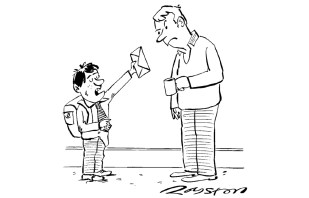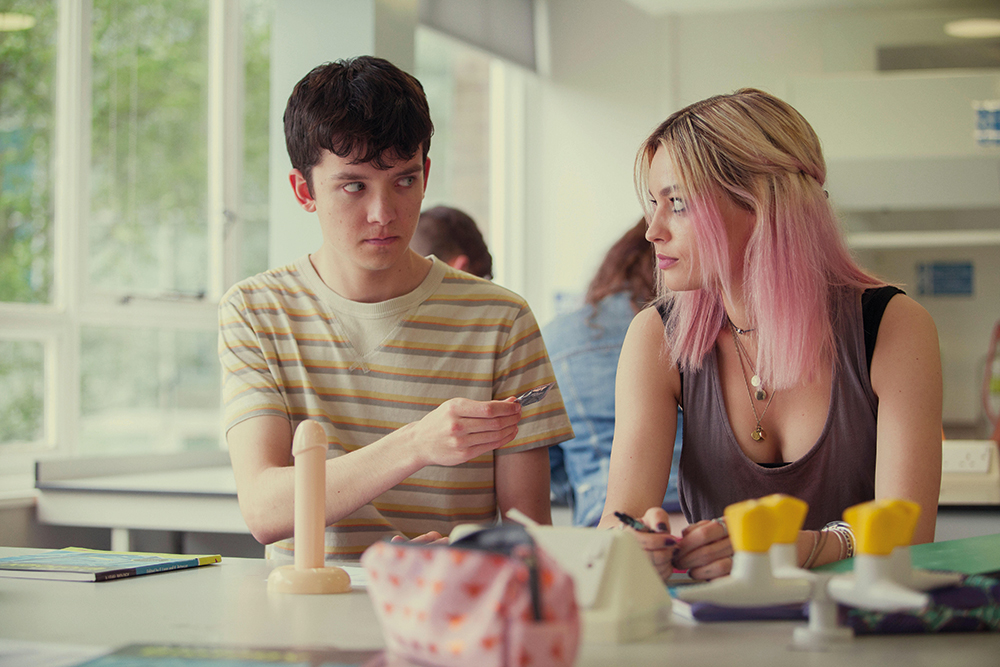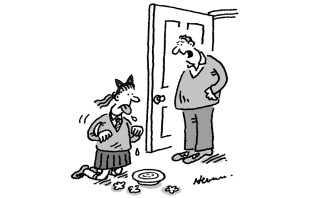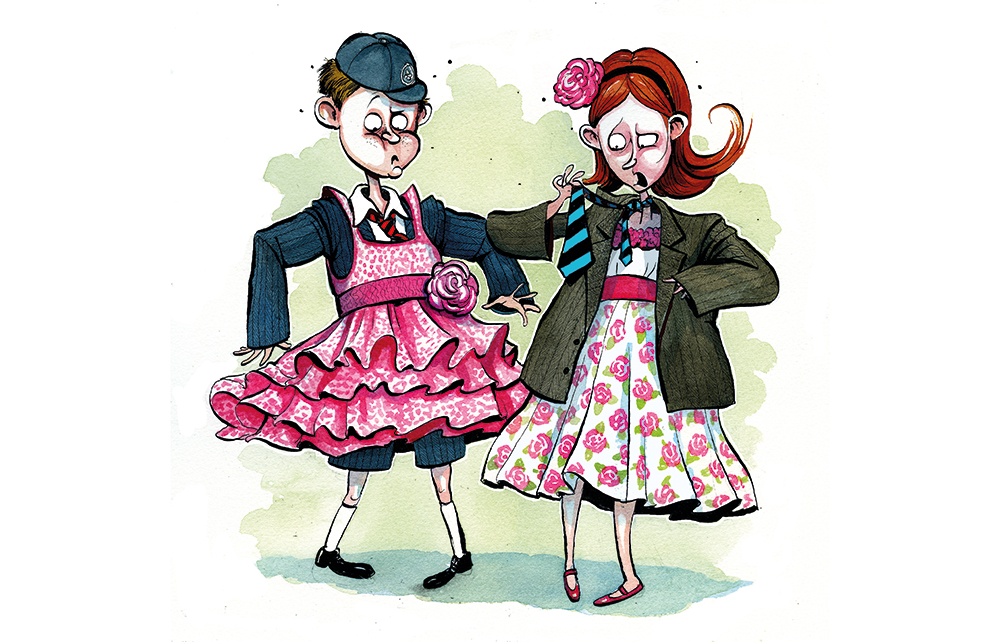This summer an independent panel of experts assembled by the Department for Education will assess the state of Relationships and Sex Education (RSE). And what a state it is.
Another lesson plan asks children to consider whether ‘virginity is made up by society’
Now compulsory for all secondary-school pupils, RSE is authorised by recklessly loose government guidance, delivered by an unregulated industry and influenced by radical gender studies academia. There are worrying cases of third-party sex education providers handing schools lesson plans on wildly age–inappropriate topics or pushing controversial ideas about gender. More worrying still, as I discovered first hand, concerned parents do not always have full access to what their children are being taught.
My pursuit for greater transparency in schools started two years ago when my 15-year-old daughter recalled being told in an RSE lesson that we live in a ‘heteronormative’ world, which was said to be a bad thing, and that she should be ‘sex positive’ in her attitude to relationships. Her lesson had been designed and delivered by an RSE charity called School of Sexuality Education. The provider’s website suggested that ‘sex positivity’ means ‘stepping away from monogamy-based assumptions’ and ‘being accepting [of] practices that are considered to deviate from the norm’.

None of this matched the information I had been given by the school, which was that she would be taught the subject of ‘sexual consent’ within the context that RSE ‘is about the understanding of family life, stable and loving relationships, respect, love and care’ – to which I had given my consent. It was this discrepancy that led me to ask to see the actual resources but I was denied a copy because the provider wished to protect their intellectual property.
In the end, I lost a landmark freedom of information case at the First-tier Tribunal court, where I had hoped to overturn a decision made by the Information Commissioner’s Office for non-disclosure.
The court established that the commercial interest of the RSE provider to keep its resources secret outweighed the public interest to have unrestricted access to what children were taught in a state-funded school. The court also ruled that the identity of visiting RSE teachers could be kept secret, since their interest for privacy outweighed the public interest to know who taught the lesson.
The decision to prioritise commercial and privacy interests over fundamental public interests – some of which are crucial to preserving the primacy of the family, democracy and the safety of children – has shocked many and gathered considerable attention. Not least because some of the workshop facilitators (‘the trusted adults’ introduced to our children) had links on their profiles on the School of Sexuality Education website which led to explicit imagery and articles that promote sex toys. Under cross examination, the School of Sexuality Education CEO claimed these materials were for adults, but nevertheless acknowledged that the RSE website was visited by children. These profiles have since been removed from the site.
Regardless of the linked adult content, what about the learning material itself? The School of Sexuality Education offered online lesson plans based around the 18+ Netflix series Sex Education and asked pupils to:
‘Write down
1) a list of phrases that could be related to sex, e.g., I like it when you X / Would you like to try X?
2) a list of words that could relate to sex, e.g., stroke, wet, hard.
‘Once you have at least ten on each list, try reading them out loud looking in the mirror (or on a video call with a friend) at least three times.’ Another lesson plan asks children to consider whether ‘virginity is made up by society’.
The School of Sexuality Education based this teaching on its publicly funded ‘intra-activist research’, which included asking children as young as 12 to draw sexting images. The explanation for this is that ‘by helping girls understand the penile power plays at work, we can give them the material, discursive, and affective tools to understand and manage this imagery on their own terms’. The research also ‘calls for a form of feminist guerrilla warfare and “injecting viruses” into normative power relations in ways that can create new openings for feminine desire and pleasure’. I’m assuming this is not exactly what the government had in mind when RSE was made compulsory.
A director of the Department for Education, an Ofsted inspector, employees of the Education and Skills Funding Agency and the Regional Schools Commissioner were made aware of this material and yet they either dismissed my concerns or chose to take no formal action. This is why I believe a new law is required to ensure transparency, since right across the education sector, wise decisions are clearly not being made as a matter of course.

All of this was noted by the tribunal judge, who accepted that these controversial practices created a ‘particularly strong public interest in parents having access to teaching materials’ – but still not enough to outweigh commercial interest. It was her opinion that nothing in education law and guidance explicitly says that parents should expect to receive copies of lessons being taught to their children.
However, for accuracy, I should note that both the tribunal judge and the Information Commissioner’s Office did not rule that I should not be able to see the resources at all – indeed they explained that their consideration was solely release to the ‘world at large’ under the Freedom of Information Act. In one meeting with the school, I was offered the chance to see the slides in question on a ‘view only’ private basis. Considering the charity had already denied me access and accused me of harassment and of being ‘anti LGBTQIA+’ for raising the whole matter, I declined to be brought into a situation of confidence and asked for a copy to be considered in a formal complaint hearing instead. No copy was supplied, meaning that the school governors were kept as much in the dark as the parents.
But both officials seemed satisfied that I had therefore had enough of a chance to view the resources, such that my rights and the wider public interest could be met and that commercial interests need not be compromised. The judge even indicated that parents could be expected to make non-disclosure agreements, just in order to be kept abreast of their children’s education, writing ‘parents could be provided with password-protected access to the written material on condition that they do not circulate the material any further than their immediate family’.
But by ‘viewing only’, without a copy of the resources, most of the public interests will still not be satisfied, since by only seeing the materials – especially under expectations of secrecy – parents cannot act upon what we see. We cannot provide details and proof of safeguarding concerns to anyone else, nor can we consider the resources together with our own children with the same access the teacher enjoyed. We also cannot bring the material into a formal complaint proceeding or take advice about the lesson from an expert, and we cannot even refer the material to the independent regulator, Ofsted.
Right across the education sector, wise decisions are clearly not being made as a matter of course
Indeed, Ofsted is unlikely to have seen any of the RSE resources produced by third party providers where they are delivered by visiting teachers, meaning parts of the RSE sector are completely unregulated by education authorities. Little wonder, then, that increasingly radical work is being produced, as specialist charities and companies compete to create novel materials to sell to schools as supposedly essential tools.
Regarding the non-disclosure of the teachers’ names, the judge justified this secrecy by suggesting the school and RSE charity’s own safeguarding processes are enough to care for our children’s safety, such that parents’ fully informed input is not necessary. This is a remarkable and appalling decision, especially since in this case the safeguarding of the School of Sexuality Education very obviously failed to keep children safe from inappropriate, sexually explicit material.
Moreover, this perspective seems not to extend to the consideration of a public interest in alerting other parents or schools to the practices of an RSE provider, in order to prevent future safeguarding risks. Nor does it anticipate that occasionally failures by individual teachers or schools might be so serious that parents want or need to take independent action over the matter, including in law.
The School of Sexuality Education has welcomed the outcome of the case, which saves its work from scrutiny. It continues to work in hundreds of schools, reaches thousands of children and influences other teachers. It is alarming that commercial secrecy comes before concerns about the primacy of the family, safeguarding and the maintenance of proper school standards.
Fortunately, the Education Secretary, Gillian Keegan, has written a letter calling for greater transparency to remind schools of their duties in that regard, explaining that if necessary: ‘Schools can show resources to parents in person on the school premises without infringing copyright.’ She also stipulated that thereafter they should take ‘urgent steps to either renegotiate these contracts or find an alternative provider at a suitable time, so that materials can be sent out or made available online to parents’.
However, this is not the law. And Keegan did not give a firm deadline by which schools should have switched from offering parents ‘view only’ access to insisting that copies of resources are provided. Indeed, her own department has indicated that offering ‘view only’ access is still an acceptable minimum for the time being.

This indicates that the Department for Education still doesn’t grasp the seriousness of the situation. If you invite adults (including people who are not trained teachers) to discuss sex and sexuality with children, there is always the potential for serious impropriety, based upon anything from poor personal boundaries or financial interests to dangerous ideology and occasionally even malevolence. Sexuality is a fundamental and powerful driver of human psychology, and it is not always a well-governed aspect of even the wisest of people.
What is needed is an amendment to the Education Act to include the obligation that schools only use resources which are published, citable and open to public and regulatory scrutiny. This is, after all, the basis of proper academia and supports free speech and thought, and I believe it is the necessary path to retain public trust in schooling.
It comes down to a basic point: who decides what is best for children? My case has revealed a worrying shift that prioritises authorities over parents as the primary safeguarders of children. Yet throughout history, it has been proved that (tragic exceptions notwithstanding) parents are the best safeguarders of their children, unmatched by the state, and certainly not bettered by commercial forces. It is said that knowledge is power, so I hope the government is prepared to shape the law to return power to parents over their children’s education.






Comments